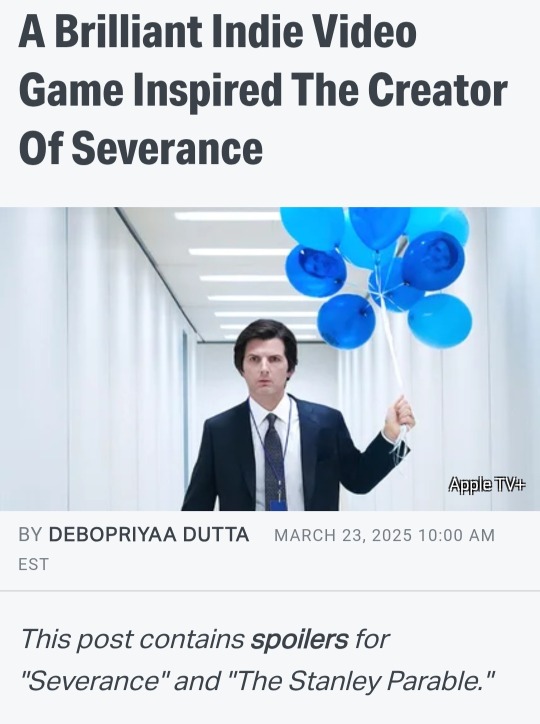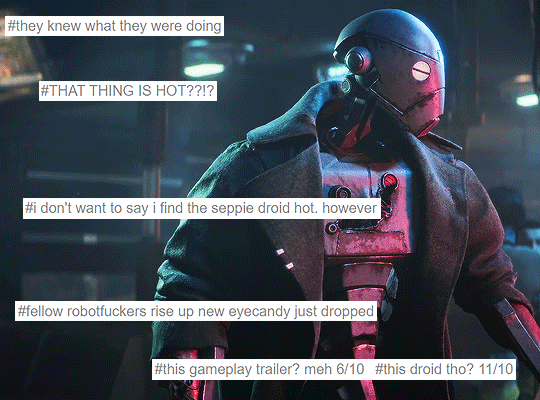#great article!
Explore tagged Tumblr posts
Text

please be what i think it is please be what i think it is please be what i think it is please be what i think it is please be what i think it is ple

FUCK YEAHHHHHHHHHHHHHHHHHHHHHHHHHHHHHHHHHHHHHHHHHHHH

#that does it. i'm watching Severance#idk if this was already a well known fact i don't go here (Severance)#the stanley parable#severance#max speaks#people: this is the greatest tv show currently running!!#me: oh great! I'll have to watch that uhhhhh... eventually? maybe in the next year or-#article: Severance was inspired by your special interest of nearly 3 years!!#me: ...now. I'll watch it right now.#stanley parable nation we're so back#did i ever mention in this post that i love the stanley parable??? i love the stanley parable. soso much. ough<33
6K notes
·
View notes
Text
No wonder “gender identity,” understood by well-meaning LGBTQ+ advocates as an abstract feeling, has done such a poor job of justifying sex change. If biological sex is part of a material structure of value, then society has a concrete interest in any potential gains or losses that may result, feelings be damned.
Gill-Peterson tells the story of Robert Stonestreet, a 10-year-old boy who was brought to the Johns Hopkins Hospital for a rare urethral defect in 1915. When the doctors informed his father that the boy had ovaries and should be reassigned as a girl, the man refused, explaining that he already had six girls at home and his son was a great help around the family farm. Of course, Stonestreet was prepubescent. Whatever biological advantage he had over his sisters was the natural spoils of working daily on a farm. The point is that his father’s social validation of his gender was the basically incidental result of an economic calculation about his sex. Twenty-one years later, Stonestreet asked the same doctors to certify him as male so he could wed his fiancée. They refused — one suspects because a marriage with no reproductive potential struck them as dead in the water, especially with the national birth rate at an all-time low. Three days later, Stonestreet committed suicide — the victim of a society that could not make up its mind on how best to make sense of his gender while also extracting value from his sex.
This is the larger historical reason why the anti-trans movement does not want transgender people to receive sex-altering care. It is not clear how, if at all, such people will fit into the division of sex in America.
-Andrea Long Chu
10K notes
·
View notes
Text
This Game Change episode had everything:
a Sam in an abandoned silver mine
Vic slowly animorphing
a jetski
Jacob using NLP on Sam
virtual clothing
Vic stealing Sam's life
Lou actually driving a literal Joker car for months
successful stock market investments
Sam not noticing a camera in his house for months
expensive dinner for six with a lemur
A SECOND JETSKI!!!!!
intentional renaissance painting
a wild Try Guy
a boy band
wildly unsuccessful gambling attempt
forcing Sam through kink therapy while everyone parties
and a full year of malicious compliance
Where the fuck do we go from here?
#game changer#dropout#sam reich#lou wilson#vic michaelis#jacob wysocki#not to mention hiding it in plain sight in an article#great start
511 notes
·
View notes
Text






CR cast has never fumbled a photoshoot and my bi ass is THANKFUL
#critical role#matthew mercer#taliesin jaffe#ashley johnson#laura bailey#travis willingham#liam o'brien#sam riegel#marisha ray#Thank you Rolling Stones for these pics#It’s a good day to be a critter holy shit#Ozzy yapping#Ozzy cr rambles#Also go check out the article/interview it’s great
1K notes
·
View notes
Text


!!!
#lando norris#abu dhabi gp 2024#speaking facts#junaid is great at having articles summarised btw#lando always speaks up for the mechanics and i love that about him. consistently done it since 2021
487 notes
·
View notes
Text

rest in peace, val
#val kilmer#top gun#iceman kazansky#read the whole article it’s great#made me weep this morning just as much as it did five years ago
337 notes
·
View notes
Text


x
#i don’t agree with everything in this article ftr—-#like this is fast paced analysis that aims to be witty first it’s nothing super insightful#acolyte and sequel trilogy analysis in particular a bit scattered#but this line . kinda great synopsis of why we’re cooked#star wars
432 notes
·
View notes
Text
"The Global North’s political economy relies on the oppression of the Global South in general and of Palestine in particular.
As academic and writer Patrick Higgins noted in late October: 'We’re seeing a blow against the US-led world system. Since, really post-World War II, but especially post-1970 or so, Israel has been the linchpin, the basket into which most of the American chips are put, in order to sustain broader control of West Asia.'
This historical reality places a profound obligation on those in the Global North who would seek to be in solidarity to seriously consider what strategies and tactics Palestinians are calling for in the struggle for liberation, sovereignty and safety.
Such calls to action do not include that we opine on Palestinians’ methods of resistance.
They do include that we understand the history and actuality of that resistance, do all we can to stop the ongoing provision of arms to the occupation, engage in boycott, divestment and sanctions, and fight back against the criminalization of those who support Palestine’s liberation from Zionist settler colonialism.
As Virginia Tech’s Bikrum Gill exhorted: 'Show no fear, no surrender, as you oppose those who support the US-Israeli genocide of Palestinians. Bring your institutions to crisis if their functioning requires silence or complicity.'"
#palestine#action#library#some great audio and video resources in the inline links in this excerpt + throughout the article
887 notes
·
View notes
Text

i don’t forget about too much
#no but of course they get along. theyre both Like That <- wsh is better at masking#whole article is excellent!! great review of his progress and includes game tape#will smith#will smith hockey#san jose sharks#sharks lb
213 notes
·
View notes
Text
17Mar25
The formula’s never finessed: Insta moots, dodgy pics, trashy press. The Sun shouts “Exclusive!” Which means it’s conclusive: Strictly business and strictly BS.
#larry#louis#louis tomlinson#mcdomlinson#stunts#the sun has an exclusive that louis and zara mcdermott are confirmed dating#based on creepy window pics at a restaurant#and some instagram activity from last month#the source for all of this is fan speculation online#so the 'media' can absolve themselves of any less-than-truth-telling#at least he's finally stunting with someone with some status#mcdermott is leveling up from reality star to bbc documentary maker#some fans are speculating this pr might be about a potential project#for the tomlinson sisters#who aspire to kardashian levels of self-absorption#they all follow her on instagram#whatever it is it definitely smells more like business than beard#'heartbreak' articles involving mcdermott's ex conveniently made the rounds yesterday#sam thompson also happens to be playing in soccer aid#which makes for great 👀 drama for the event#i love that louis is on the record hating love island#which she was on in 2018#she was also on strictly come dancing#and x factor celebrity#media literacy is dead#limerick-lt#march 17#2025
220 notes
·
View notes
Text





Jackie article of all time
#yellowjackets#jackie taylor#lu rambles#It also makes me feel so vindicated because hah!#pre crash jackie is more femme on purpose because shes dressing for others not herself!#hah shes not a mean girl!#and hah! bonus points for jackie autism on imitating how to be a Normal Person!#i have mentioned this on the lottielee server but i dont think ive posted it here before#seriously its such a great article when it comes to understanding jackie
238 notes
·
View notes
Text
if max verstappen said he'd only join mercedes if george russell left do you think toto would tell george personally that he's kicked to the curb or would he just let him figure it out while toto yaps to the press
#george: hey toto this news article says your drivers for next year are max and kimi#toto: omg isnt it great?!#max verstappen
170 notes
·
View notes
Text
Greenbelt Maryland. Or, how America almost solved housing only to abandon it.

**I AM NOT AN EXPERT! I AM JUST AN ENTHUSIST! DO NOT TREAT MY OPINIONS/SPECULATION AS EDUCATION!**
During the Depression America faced a housing crisis that rhymes with but differs from our own. It’s different in that there wasn’t a supply issue, there were loads of houses in very desirable areas, but they were still unaffordable as people’s incomes collapsed causing a deflationary spiral. While the housing supply subtly grew and succeeded demand, people simply couldn’t pay the meager rents and mortgages. Herbert Hoover failed to manage the Depression, while his inaction is greatly exaggerated, his policy of boosting the economy with works projects and protecting banks from runs failed and the depression only got more pronounced in his term. In comes Franklin Roosevelt, a progressive liberal much like his distant and popular cousin/uncle-in-law Teddy. Franklin’s plan was to create a large safety net for people to be able to be economically viable even if they’re otherwise poor. These reforms are called the New Deal and they did many controversial things like giving disabled and retired people welfare, giving farmers conditioned subsidies to manipulate the price of food, a works program to build/rebuild vital infrastructure, etc. One of these programs was the USHA (a predecessor of America’s HUD), an agency created to build and maintain public housing projects with the goal of creating neighborhoods with artificially affordable rents so people who work low-wage jobs or rely on welfare can be housed.
In this spirit, the agency started experimenting with new and hopefully efficient housing blueprints and layouts. If you ever see very large apartment towers or antiquated brick low-rise townhouses in America, they might be these. The USHA bought land in many large and medium-sized cities to build “house-in-park” style apartments, which is what they sound like. Putting apartment buildings inside green spaces so residents can be surrounded by greenery and ideally peacefully coexist. Three entire towns were built with these ideas outside three medium-sized cities that were hit hard by the depression; Greenbelt outside DC, Greenhills outside Cincinnati, and Greendale outside Milwaukee. The idea was to move people out of these crowded cities into these more sustainable and idyllic towns. There were many catches though, the USHA planned for these towns to be all-white, they used to inspect the houses for cleanliness, they required residents to be employed or on Social Security (which basically meant retired or disabled), they also had an income limit and if your income exceeded that limit you were given a two-month eviction notice, and you were expected to attend town meetings at least monthly. While the towns didn’t have religious requirements they did only build protestant churches. Which is an example of discrimination by omission. While a Catholic, Jew, Muslim, etc could in theory move into town they also couldn’t go to a Catholic church, synagogue, or Islamic center without having to extensively travel. Things planned communities leave out might indicate what kind of people planned communities want to leave out. Basically, the whole thing was an experiment in moving Americans into small direct-democracy suburbs as opposed to the then-current system of crowded cities and isolated farm/mine towns. This type of design wasn’t without precedent, there were famously company towns like Gary and Pullman which both existed outside Chicago. But those lacked the autonomy and democracy some USHA apparatchiks desired.
The green cities were a series of low-rise apartments housing over a hundred people each, they were short walks from a parking lot and roads, and walking paths directly and conveniently led residents to the town center which had amenities and a shopping district. Greenbelt in particular is famous for its art deco shopping complex, basically an early mall where business owners would open stores for the townspeople. These businesses were stuck being small, given the income requirements, but it was encouraged for locals to open a business to prove their entrepreneurial spirit. Because city affairs were elected at town meetings the city was able to pull resources to eventually build their own amenities the USHA didn’t originally plan for like a public swimming pool or better negotiated garbage collection.
These three cities were regarded as a success by the USHA until World War II happened and suddenly they showed flaws given the shift in focus. These towns housed poor people who barely if at all could afford a car, so semi-isolated towns outside the city became redundant and pointless. The USHA also had to keep raising the income requirement since the war saw a spike in well-paying jobs which made the town unsustainable otherwise. During the war and subsequent welfare programs to help veterans, these green cities became de facto retirement and single-mother communities for a few years as most able-bodied men were drafted or volunteered. Eventually, the USDA would make the towns independent, after the war they raised the income limit yet again and slowly the towns repopulated. As cars became more common and suburbanization became a wider trend these towns would be less noticeably burdensome and were eventually interpreted as just three out of hundreds of small suburban towns that grew out of major cities. They were still all-white and the town maintained cleanliness requirements; after all they lived in apartments it just takes one guy’s stink-ass clogged toilet to ruin everyone’s day.
By the 1950’s these towns were fully independent. Greendale and Greenhills voted to privatize their homes and get rid of the income limit all together so the towns can become more normal. Greenhills, Ohio still has many of these USHA-era houses and apartments, all owned by a series of corporations and private owners. Greendale, Wisconsin property owners have demolished most of these old houses and restructured their town government so most traces of its founding are lost. But Greenbelt, Maryland still maintains a lot of its structure to this day. Greenbelt has privatized some land and buildings, but most of the original USHA apartments are owned by the Greenbelt Homes, Inc cooperative which gives residents co-ownership of the building they live in and their payments mostly go to maintenance. Because Greenbelt was collectively owned the House Un-American Activities Committee would blacklist and put on trial most of Greenbelt’s residents and officials. Though they didn’t find much evidence of communist influence, the town was a target of the red scare by the DMV area, residents were discriminated, blacklisted, and pressured into selling their assets. While Greenbelt did commodify some of the town, the still existing co-ownership shows the town’s democratic initiative to maintain its heritage. The green cities desegregated in the 50’s and 60’s depending on state law, Greenbelt was the last to desegregate under the Civil Rights Act of 1964, while discrimination persisted for years by the 1980’s the town would become half non-white, today the town is 47% black and 10% Asian.
Though these towns largely integrated with a privatized and suburbanized America, they do stand as a memorial to an idea of American urbanism that died. They were designed for walkability and were planned to be more democratic and egalitarian towns, with the conditions that came with segregation and government oversight. You can’t ignore the strict standards and racism in their history, but you can say that about many towns. How do you think America would be different if more cities had green suburbs that were more interconnected and designed for community gatherings?
#urbanism#DC#maryland#dmv#Cinncinatti#milwaukee#ohio#wisconsin#New Deal#history#fdr#franklin roosevelt#politics#urban#city#apartment#housing#great depression#article#co op#socialism#segregation#discrimination#housing crisis#landlords#united states
224 notes
·
View notes
Text
Reporting bots in the asexual tag is quickly turning into my favourite hobby
It's actually kinda nice of those bots to deliver a wide variety of content. Tiddies, nutrition supplements, travel, some arabic texts. I even had a crypto post just now!
And if you're not a bot, but wrongly use the tag on a post that has nothing to do with asexuality at all, you just get caught in the crossfire. Sorry not sorry.
#asexual#the bots won't win#this should get a wikipedia article or something#the great asexual vs bot war#practice run for denmark#yes i am fluent in sarcasm#garlic bread for the reporters#how to keep your asexual happy
454 notes
·
View notes
Text





ND-5 & tags
#sw edit#swedit#star wars#star wars outlaws#nd 5#videogames#i had to ok this has been a great source of entertainment this week#good lord you all#I AGREE. with the comments about the jacket and the trailer being kinda meh but he's 11/10#honestly though i think my favourite thing is the gamer.com article that's titled like 'oh no the star wars outlaws robot is hot' lmao#*gif
2K notes
·
View notes
Text








387 notes
·
View notes